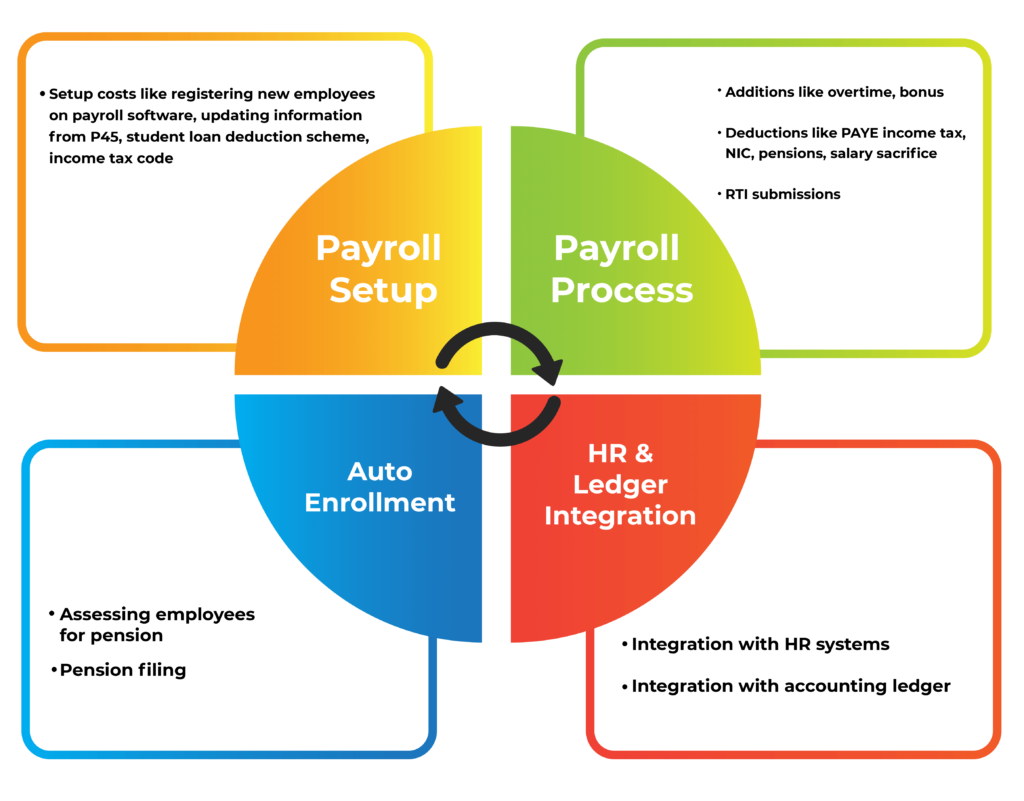Accurate and timely payroll improve employee happiness and helps you stay in compliance and avoid fines. In-house payroll processing may be costly both in terms of money and time, and often small business owners cannot afford it on their own.
The slightest payroll error can damage your company’s credibility and leave you with dissatisfied employees. Employees dislike nothing more than getting wrong pay. Despite the added cost to your company, many businesses find outsourcing payroll saves them time and money.
Now that you have decided to outsource payroll, the next big question is, “How much does a payroll processing cost?” We’ve analysed the statistics, so keep reading to see if this time-saving solution is perfect for your company.
Table of Content
What is the typical cost of payroll outsourcing

For more details read our blog on :What is payroll
There are a few essential areas that eat into your budget when it comes to outsourcing payroll:
Complete outsourcing your payroll to a third party is one of the most common ways to outsource payroll. The third-party will deal with HMRC on your behalf and answer payroll questions from your employees.

So, how much does a payroll service cost per employee?
The cost will vary depending on factors like the number of employees, frequency of pay run, pension scheme setup, number of joiners and leavers, etc.
Still, for a outsource payroll service, you can likely spend the following amounts on average:
| ○ Setup – £10 to £20 per new employee ○ Monthly payroll service – £5 to £15 per employee ○ Monthly auto-enrolment into a pension plan – £2 to £6 per employee ○ Monthly HR integration – £10 to £25 per employee |
Employers employing a large number of employees will have lower per employee costs, thus while a small business would spend £8 to £15 per employee per month on payroll services, a much larger company could pay as little as £5.
This usually includes access to cloud-based self-access portals for employees.
What is the structure of payroll pricing?
While there are various methods that payroll firms charge customers for their services, you’ll most likely see three of them. We’ll figure out the typical payroll cost for a company with ten employees that pays bi-weekly for each.
| Frequency | The most common way payroll businesses charge for their services is by charging fees based on pay frequency. That means you’ll pay for how often you pay employees (weekly, fortnightly, or monthly). It is also known as pay per payslip. This method works well for organisations with inconsistent payrolls with many modifications or extra payroll runs. An example will be a restaurant. |
| Per-employee-per-month (PEPM) | This pricing structure is gaining popularity since it often saves businesses money. Instead of paying costs for each payroll, PEPM allows you to run an unlimited number of payrolls for a single monthly base charge plus a fixed rate for the number of employees you pay each month. PEPM is a good solution for businesses requiring additional payroll runs for bonuses or commissions. |
| Fixed pricing | A payroll firm may charge a fixed monthly rate for a defined number of employees in some cases, particularly with Do-It-Yourself (DIY) online solutions. Be aware that some organisations may limit the number of employees for whom you can process payroll, so this may not be an option for every company. However, if your company is small and your employee count is stable, this can be a simpler and less expensive way to outsource payroll. |
Payroll processing costs: How to cut costs?
You have some options for lowering payroll expenditures, such as optimising business procedures, implementing field service management software, and modifying pay intervals.
Here are 7 easy ways to cut your payroll costs.
| ○ Payroll period ○ Use a timekeeping system ○ Improve employee retention ○ Temporary employees ○ Integrate payroll, bookkeeping & accountancy ○ Consider outsourcing ○ Avoid penalties and interest charges |
● Payroll periods
Consider switching to fortnightly pay periods if you now pay your staff weekly. You will pay half the expense of paying direct deposit fees 26 times per year per employee.
● Use a timekeeping system
Computing time manually from employee timesheets is a time-consuming task. Use time tracking tools to calculate employees hours and hence the pay.
● Improve employee retention
Hiring a new employee brings fresh blood to the organisation; however, it is costly. Main costs include onboarding, training and payroll setup.
● Temporary employees
Temporary workers are an excellent resource for many activities and can help you save money on payroll.
You are not required to calculate payroll for these employees. Instead, the temp agency sends you a charge for their services.
Because the staffing agency handles payroll for this personnel, you may focus on other tasks rather than worrying about payroll.
However, keep in mind that staffing firms frequently demand a premium over the market rate for workers.
● Integrate payroll, bookkeeping & accountancy
Combining a payroll service with bookkeeping and accounting software is easy for all businesses now- thanks to evolving technology.
With integration, you will control tasks like compensation, benefits, taxation amounts, accounting journals and payroll system reconciliations.
Every time you run payroll or submit an RTI, your accounting software automatically creates a journal entry, saving you time, effort, and energy.
It will ensure that the books and payroll ledgers are in constantly in sync. It is an integral part of accurate reporting, both for business and payroll taxes.
● Avoiding payroll penalties requires accurate payroll processing.
According to HMRC, 40% of small and medium-sized businesses pay interest charges and penalties for failing to deposit PAYE/NIC, miscalculating withholdings, or filing incorrectly.
The liability for these businesses is £845 per year on average.
Making even minor errors when calculating your company’s payroll can result in penalties when tax season arrives.
To avoid payroll penalties, always double-check the numbers, no matter what form of payroll solution you employ.
● Consider outsourcing
Payroll outsourcing includes all payroll processing operations.
It includes maintaining employee records, estimating salaries and benefits, computing incentives, distributing payslips, generating payroll related reports, and complying with HMRC laws.
Key benefits of payroll outsourcing, like any other form of outsourcing, are: saves time, accurately calculates taxes, reduces fines, penalties, or inspections, peace of mind, and lowers overhead expenses.
For more details read our blog on Outsourcing Payroll: The Pro’s and Con’s
What would it cost to manage payroll on your own?
If outsourced payroll isn’t for you, you could do it yourself. However, there are a few reasons why this might not be the best option for your company.
● Staff costs
You’ll need specialised payroll staff, and even if you do, handling payroll for organisations with ten or more employees may be a time-consuming task.
● Administration costs
The costs of administering payroll in-house frequently outweigh any possible cost savings from outsourcing this service.
● Software costs
There is a range of software available in the market.
Top-end software has a fixed base price plus per payslip costs. If you only have few employees, it can be costly.

Winding-up
There are several things to consider when outsourcing your payroll.
Learn which firms are regarded as the top regional and national payroll providers to begin your journey.
Whatever the case may be, you will still payroll fees, whether locally or outside.
Even so, you should conduct a cost-benefit analysis to guarantee that the path and the Expert you choose will save your business money in the long term.
If you’re thinking about outsourcing your payroll services, you might want to think about upgrading your payment system and outsourcing it to a payroll expert for effective results.












Leave a Reply